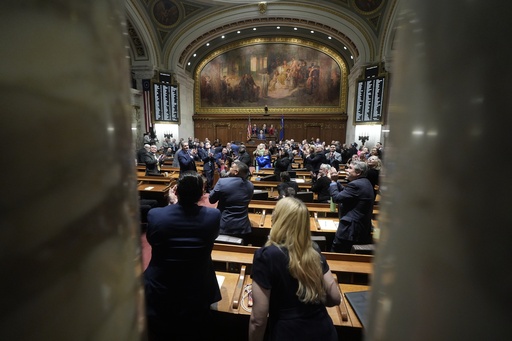
MADISON, Wis. — During his seventh State of the State address on Wednesday, Wisconsin Democratic Governor Tony Evers appealed to the Republican-led Legislature to consider a variety of proposals that have previously met resistance. Among the proposals highlighted were a series of gun control measures introduced shortly after a tragic school shooting occurred just a short distance from the state Capitol.
As expected, Republican lawmakers were quick to reject Evers’ initiatives, continuing a trend seen throughout his six years in office.
In his address, Evers emphasized the importance of bipartisan collaboration to confront challenges relating to immigration and health care. He carefully avoided direct reference to former President Donald Trump but expressed a sense of unease regarding future developments. Evers stated, “I have always been willing to work with anyone who is willing to do the right thing for the people of Wisconsin… But I will not compromise on our Wisconsin values of treating people with kindness, dignity, empathy, and respect.”
In response to immigration concerns, Assembly Speaker Robin Vos indicated that Republicans plan to propose a bill that would require collaboration with federal law enforcement to deport undocumented individuals who have committed crimes. Meanwhile, Assembly Majority Leader Tyler August criticized Evers for not being attentive to recent election results in the state, asserting that Trump’s stance on immigration heavily influenced his campaign.
Regarding gun control, Evers reiterated his call for measures aimed at enhancing gun safety just five weeks after a violent incident claimed the lives of a teacher and a student nearby. His proposals included universal background checks, reinstating a 48-hour waiting period for gun purchases, banning “ghost guns,” and eliminating loopholes that let domestic abusers access firearms. Evers also advocated for new policies mandating safe gun storage and proposed a “red flag” law allowing judges to confiscate firearms from individuals deemed a danger to themselves or others. Republican leaders, however, swiftly announced that they would reject all suggested gun control measures.
In a marked effort to address mental health, Evers, who has a background as a teacher and state education superintendent, proposed an investment of $300 million aimed at enhancing mental health services in schools—a figure far exceeding the previous legislative allocation.
As for the Republican response to Evers’ proposals, they dismissed them as unrealistic, preferring instead to advocate for substantial tax cuts estimated to provide nearly $1,000 back to each taxpayer in Wisconsin. Vos characterized Evers’ speech as filled with liberal hopes and empty assurances, stating that much of what was proposed would not see implementation.
Seeking to address childcare costs, Evers declared 2025 the “Year of the Kid” and asked for $500 million to sustain the Child Care Counts program, which is facing potential discontinuation without additional funding. In contrast, Republican lawmakers voiced their disagreement regarding any increase in funding for this initiative.
Additionally, Evers proposed initiatives to manage prescription drug prices and reform drug company oversight, including exempting certain over-the-counter medications from state sales tax and capping insulin copays at $35.
In a heartfelt moment during the address, Evers honored the family of former state Representative Jonathan Brostoff, who tragically died by suicide in November, as he introduced a new initiative allowing voluntary registration to temporarily restrict oneself from purchasing firearms. Vos quickly condemned Evers’ mention of Brostoff as a “cheap political stunt,” expressing disappointment over how the situation was handled.

